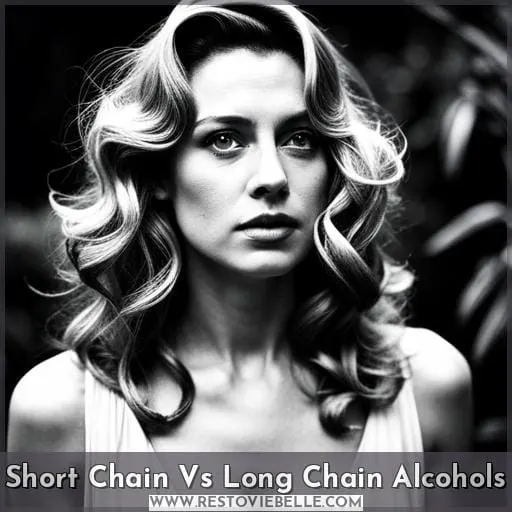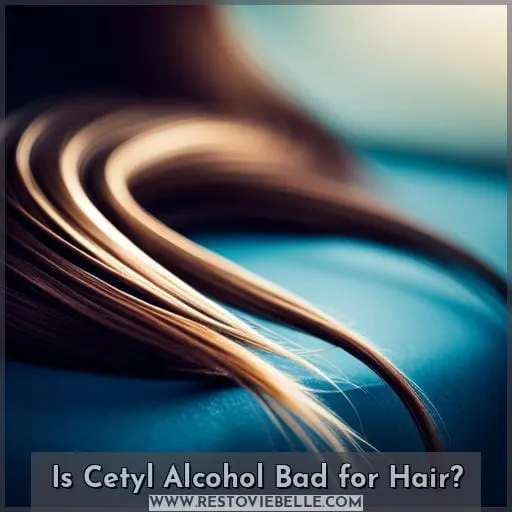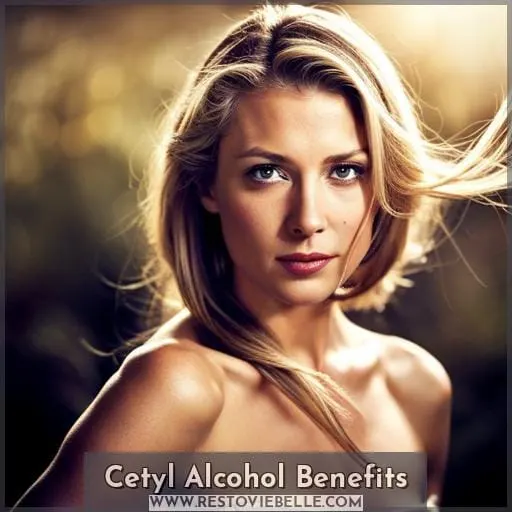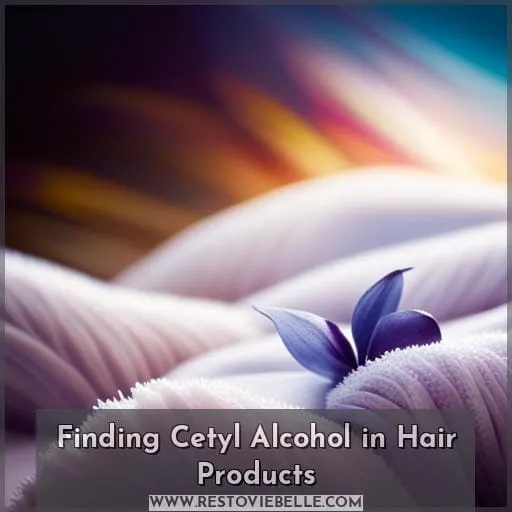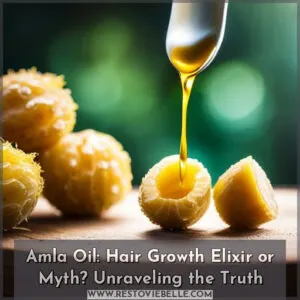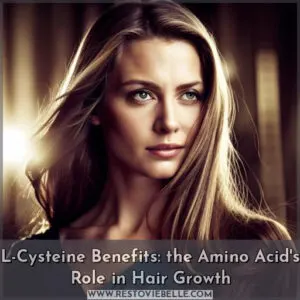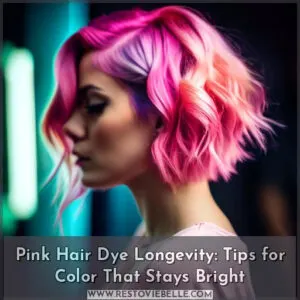This site is supported by our readers. We may earn a commission, at no cost to you, if you purchase through links.
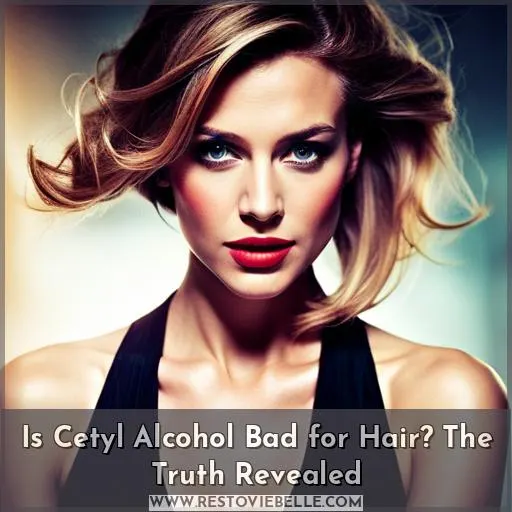 As the old adage goes, don’t judge a bottle by its label. Cetyl alcohol, found in many hair products, gets a bad rap due to its name. However, unlike drying forms of alcohol, cetyl alcohol actually provides hydration, softness and frizz reduction.
As the old adage goes, don’t judge a bottle by its label. Cetyl alcohol, found in many hair products, gets a bad rap due to its name. However, unlike drying forms of alcohol, cetyl alcohol actually provides hydration, softness and frizz reduction.
So before you toss your favorite conditioner, understand the truth – cetyl alcohol nourishes locks.
Table Of Contents
Key Takeaways
- Cetyl alcohol is a nourishing alcohol that replenishes nutrients, smooths hair, and penetrates the hair shaft.
- Drying alcohols, such as ethanol and isopropanol, strip moisture from hair, while nourishing alcohols, like cetyl alcohol, hydrate hair and counter dryness, damage, and frizz.
- Cetyl alcohol offers benefits such as moisture retention, smoothing of cuticles, shine, touchable softness, frizz control, flyaway taming, and enhanced color vibrancy.
- Consumers can find cetyl alcohol in hair products by checking the ingredient list for terms like cetyl alcohol or cetearyl alcohol.
Cetyl Alcohol Overview
You may be wondering what exactly cetyl alcohol is and where it’s commonly found.
Cetyl alcohol is a long-chain fatty alcohol that occurs naturally in the oils and waxes of plants and animals.
It’s frequently used as an emollient, emulsifier, and thickening agent in hair care products and cosmetics to help moisturize and improve texture.
What is Cetyl Alcohol?
When you’re reviewing ingredients in hair products, you may come across cetyl alcohol and wonder what it is.
Cetyl alcohol is a waxy, fatty alcohol derived from vegetables that serves key functions in hair care products. Unlike drying forms of alcohol like ethanol, cetyl alcohol exhibits hydrating properties, softening both the hair cuticle and skin.
Its safety is supported by research, though rare allergic reactions have occurred.
Overall, cetyl alcohol’s inclusion in shampoos, conditioners, and styling products contributes to enhanced texture, shine, and flexibility. Finding cetyl alcohol among other nourishing ingredients indicates a formula designed for strength and manageability.
Where is It Found?
You’ll find cetyl alcohol in a variety of personal care and cosmetic products, including lotions, creams, shampoos, and conditioners, thanks to its emulsifying and thickening properties.
Derived from coconut oil or palm oil.
Added to formulations for texture.
Generally considered safe.
Approved for use by FDA.
Some individuals may experience allergic reactions to cetyl alcohol, resulting in redness or irritation. As with any ingredient, perform a patch test if concerned about sensitivity. When used appropriately, cetyl alcohol provides moisturizing effects without drying out hair.
Short Chain Vs Long Chain Alcohols
Let’s now delve into the topic of short chain alcohols versus long chain alcohols.
It’s important to understand the distinction between these two types, as they can have different effects on hair.
Short chain alcohols, such as ethanol and propanol, are often drying and can leave hair brittle, while long chain fatty alcohols like cetyl alcohol are known for their nourishing and hydrating properties.
By understanding this difference, you can make informed choices when selecting hair care products that contain alcohol.
Drying Alcohols to Avoid
To understand the effects of cetyl alcohol on hair, it’s important to differentiate between drying alcohols and nourishing alcohols.
Certain short chain alcohols like ethanol, isopropanol, and SD alcohol quickly evaporate, stripping hair of its natural moisture.
In contrast, long chain fatty alcohols like cetyl alcohol replenish nutrients, strengthen and smooth hair due to their high molecular weight and ability to penetrate the hair shaft.
| Drying Alcohols | Nourishing Alcohols |
|---|---|
| Ethanol | Cetyl Alcohol |
| Isopropanol | Stearyl Alcohol |
| SD Alcohol | Cetearyl Alcohol |
Nourishing Alcohols
Unlike drying alcohols, you’ll find long chain fatty alcohols actually nourish your hair by providing hydration and shine.
Referred to as moisturizing or emollient alcohols, ingredients like cetyl alcohol are well-established hair conditioners. Through moisture retention science, these plant-derived fatty alcohols counteract dryness and damage while enhancing texture.
Rare allergic reactions may occur. When expertly formulated into hair care, however, cetyl alcohol’s safety and effectiveness for adding softness, managing frizz, and promoting hair health is undisputed.
Is Cetyl Alcohol Bad for Hair?
One shouldn’t assume cetyl alcohol is bad for your hair.
Carrying on from the previous discussion distinguishing between drying alcohols and nourishing ones, cetyl alcohol falls into the latter category.
As a fatty alcohol derived from coconut oil, cetyl alcohol is known for its emollient properties that help hair retain moisture.
While rare allergic reactions can occur for sensitive individuals, most hair types can benefit from cetyl alcohol.
It smooths the hair cuticle to increase shine, reduces frizz, and improves manageability without weighing hair down.
Cetyl alcohol even helps other nourishing ingredients penetrate deeper to maximize hydration.
Consult your dermatologist if negative effects arise, but typically cetyl alcohol simply nourishes hair as part of a healthy hair care routine.
Suitable ingredient alternatives depend on your hair goals, so discuss options with your stylist.
Cetyl Alcohol Benefits
When reviewing cetyl alcohol’s effects on hair, it’s crucial to highlight the positive properties.
Namely, cetyl alcohol helps hair retain moisture and appear smooth by filling gaps in the hair cuticles. This also assists with frizz reduction by sealing the cuticle and creating shine.
Softness and Shine
When using products containing cetyl alcohol, you’ll find your hair takes on enhanced softness and radiant shine.
- Cetyl alcohol coats each strand, smoothing the cuticle for touchable softness.
- It penetrates the hair shaft, trapping moisture inside for long-lasting hydration.
- Your hair reflects light better thanks to smoothed cuticles that enhance natural shine.
- Cetyl alcohol’s emollient properties tame flyaways and control frizz even in humidity.
- As an added perk, it helps retain color vibrancy between salon visits for gorgeous color.
Hydration and Frizz Reduction
For you, cetyl alcohol also provides superior hydration while taming frizz and flyaways.
As an expert moisturizer, cetyl alcohol helps hair retain moisture, keeping strands smooth and sleek. It counters the notorious frizz and static that can plague curly and wavy hair types, allowing more defined texture and bounce.
You may have heard hydrating myths about alcohols, but cetyl alcohol defies expectations. Its unique structure enables thorough product penetration and lasting softness without heaviness. Compatible with various styling products, cetyl alcohol boosts shine, suppleness and longevity of your chosen look.
Discover cetyl alcohol’s hydrating prowess through the [BRAND] Moisture Recovery line, specially formulated to drench dry, damaged hair in nourishing ingredients for strength and manageability.
Finding Cetyl Alcohol in Hair Products
To find cetyl alcohol in hair products, simply check the ingredient list on the product packaging.
The ingredient list is usually located on the back or side of the packaging and is required by law to include all ingredients present in the product.
Look for terms such as cetyl alcohol, cetearyl alcohol, or other related names.
Cetyl alcohol can be found in a variety of hair care products, including shampoos, conditioners, styling creams, and leave-in treatments.
It’s commonly used as an emulsifier and thickening agent to create stable formulations that provide texture and improve product performance.
When checking for cetyl alcohol in hair products, it’s also important to consider your specific needs and preferences.
If you have sensitive skin or are prone to allergic reactions, it may be beneficial to choose products that are labeled hypoallergenic or formulated without common allergens.
Additionally, different hair types may require different levels of moisture retention provided by cetyl alcohol.
For individuals with dry or damaged hair who need extra hydration and softness benefits from this ingredient can be particularly advantageous.
In summary, finding cetyl alcohols listed among ingredients implies inclusion within cosmetic formulations designed specifically for their positive effects on various types of hairs.
Frequently Asked Questions (FAQs)
Does cetyl alcohol cause buildup on hair?
No, cetyl alcohol doesn’t cause buildup on hair.
As a fatty alcohol derived from coconut oil, cetyl alcohol helps hair care products spread evenly and provides moisturizing benefits.
When formulated properly in hair products, cetyl alcohol nourishes hair without leaving residue.
Is cetyl alcohol safe for color-treated hair?
Yes, cetyl alcohol is generally considered safe for color-treated hair when used as directed.
As a fatty alcohol derived from coconut oil, it provides needed moisture without weighing hair down or causing buildup.
Moderation remains key, but cetyl alcohol’s hydrating properties can help maintain colorful, healthy locks.
What percentage of cetyl alcohol is ideal in conditioners?
Ideal cetyl alcohol levels in conditioners range from 1-5%.
This concentration smooths hair cuticles for hydration and shine while avoiding heaviness.
We suggest patch testing new products if sensitive, as some react to ingredients benefiting most.
Ultimately, finding the right balance for your hair takes experimentation.
Does cetyl alcohol have any links to cancer or other diseases?
There is no conclusive evidence linking cetyl alcohol to cancer or other diseases.
As with any personal care ingredient, some individuals may experience irritation or allergic reactions.
Overall cetyl alcohol is considered safe when formulated and used properly in cosmetics.
Consult a dermatologist if you have any concerns.
What is the difference between cetyl alcohol derived from coconut oil versus palm oil?
The difference between cetyl alcohol derived from coconut oil versus palm oil lies in their respective sources.
While both are commonly used in haircare products, each source provides unique properties and benefits for the hair.
Conclusion
Ultimately, cetyl alcohol is no foe but friend to hair. This nourishing moisturizer brings softness, shine, and frizz reduction without harsh drying effects. So rather than tossing your favorite conditioner, embrace cetyl alcohol’s gifts of hydration and nourishment for your locks.
With knowledgeable understanding, we can move beyond labels to experience ingredients’ true impacts. When it comes to cetyl alcohol, the verdict is clear – this is one alcohol locks love.


